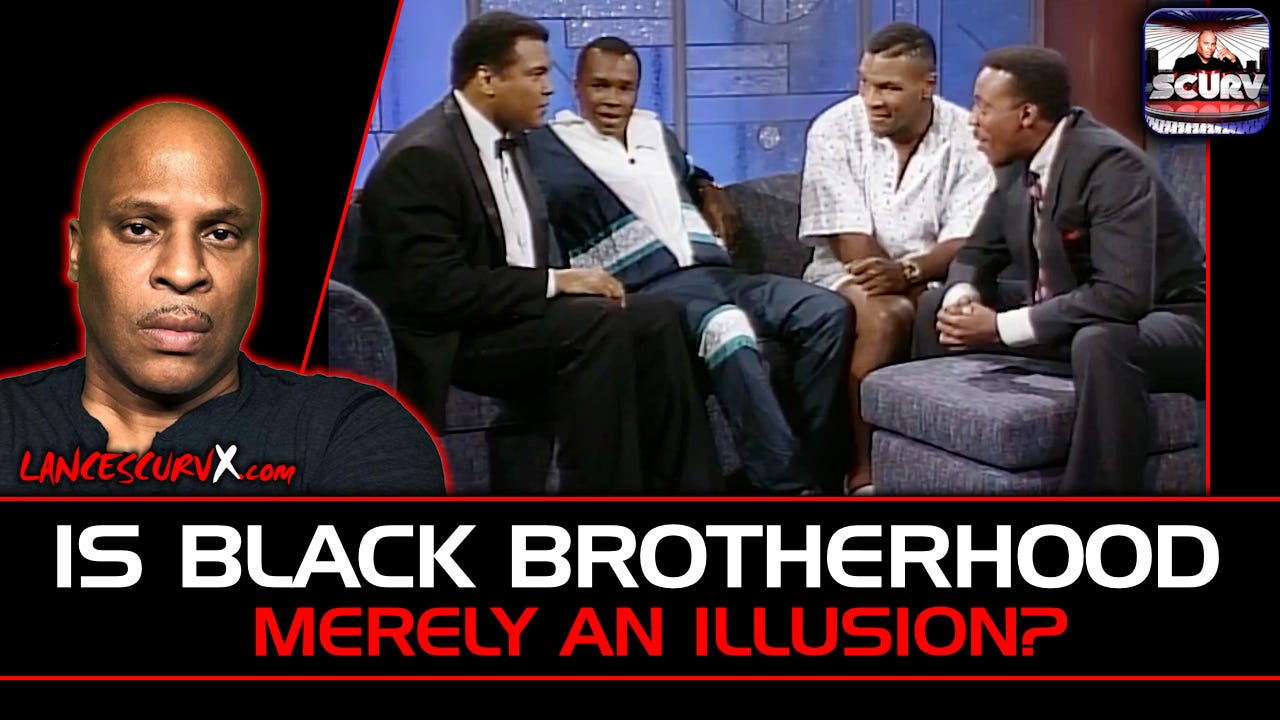THE ILLUSION OF BLACK BROTHERHOOD...
WHY WE STAND ALONE IN A WORLD BUILT ON NETWORKS
We are the only group on Earth who loudly proclaims “brotherhood,” yet lives in a reality where every man is an island. Other communities may have their internal disagreements, their political differences, and even their quiet rivalries—but they still move as one when it comes to their economic security, their legacy, and their survival. They understand something we refuse to: power isn’t about individual brilliance; it’s about collective alignment.
Look around the world. Poor or rich, other groups maintain a network. The Asian corner store owner, the Middle Eastern grocer, the Jewish lawyer, the Italian restaurant family—whether wealthy or struggling, they are backed by communities that create an ecosystem of support. A son does not begin life at zero; he begins where his father left off. Businesses are not just careers, they are inheritances. Networks are not favors—they are expectations and obligations tied to collective identity.
Meanwhile, Black men, despite having the language of “brother,” live in a wilderness of disconnection. If there are a million Black men, there are a million separate, isolated entities moving without unity, purpose, or shared mission. We speak the language of unity while practicing the art of individualism. We greet each other with “brother” but fail to operate as one.
This is why we suffer.
Fingers vs. Fist: The Cost of Disconnection
A single finger has no force. It can be bent, broken, or ignored. But when fingers close and form a fist, they generate unstoppable power. Today, Black men are individual fingers—spread wide, easy to divide, easy to conquer. Even when we are on the same hand, we refuse to close into a unified force. Every other group understands this essential truth: individual success is meaningless without community power.
We have mistaken cultural expression for structural unity. We have mastered slang, fashion, and ego-driven performances of brotherhood—but when it comes to economic systems, business partnerships, political coalitions, or building institutions, we retreat into distrust, competition, and isolation.
Our downfall did not begin with our lack of resources—it began with the strategic dismantling of our masculine ability to form alliances.
The Historical Assault on Black Male Unity
This is not accidental. The breaking of the Black man was methodical. The enslaver did not primarily attack our bodies—he attacked our bond. Lynchings, castrations, public humiliation, family separation, and social engineering were not designed simply to terrorize individuals, but to destroy our ability to trust, build, and lead collectively.
Then came welfare policies that rewarded the removal of the Black man from the home. Then came media narratives that glorified the hyper-individual, hyper-consumer Black male—a performer, not a builder. Then came modern culture, which replaced institutions with influencers, and leadership with likes.
And so today, Black men confuse visibility with power, while other communities quietly build ownership and institutions behind the scenes.
The Only Time We Saw Brotherhood—And Why It Frightened the System
The only modern example where Black men moved with disciplined unity was the Nation of Islam. Whatever one may believe about their ideology, their structure was undeniable. Men stood in formation. Businesses were developed. Order was established. Even celebrities trusted them for security because they embodied what a brotherhood looks like in motion.
But even that was dismantled from within and without—because true unity among Black men is the single greatest threat to the global order that profits from our dysfunction.
Today, that structure barely exists. And even where remnants survive, they lack the economic ecosystem, land ownership, and institutional networks necessary for full independence. The best structured example of Black male unity is still fractured. That reality should shake us awake.
Why Other Groups Advance While We Remain Stagnant
It is not because others are smarter, more moral, or more loving toward each other. It is because they understand a principle we continually reject:
“United we stand, divided we fall.”
White men share wealth not out of emotional love, but out of strategic necessity. Asian men empower their sons not because of sentimental attachment, but because their survival depends on it. Middle Eastern men invest in each other’s businesses because the strength of one family is tied to the strength of their community.
We, on the other hand, believe that our individual grind will somehow turn into collective advancement.
It never has.
It never will.
When Men Are Out of Order, the Whole House Collapses
Every functioning community is built on the alignment of its men. Women are not meant to stand in front—they stand with the men who stand together. When men are fractured, women scatter. When men compete instead of cooperate, women step into the role of protectors and providers—not because they desire to, but because nature hates a vacuum.
If the men do not lead collectively, the community will always be led externally—by corporations, by foreign interests, by politics, by anything except itself.
The Mission Ahead
We must stop romanticizing the word “brother” and begin honoring its responsibility.
Brotherhood is not a greeting—it is an economic agreement.
Brotherhood is not emotional—it is strategic.
Brotherhood is not about how we feel—it is about what we build.
Brotherhood is not shown in speeches—it is shown in the infrastructure we leave behind.
We have tried individual success for generations. It has not freed us. It has only made us celebrated captives. The time has come to reawaken our collective instinct—the same instinct that built ancient nations, defended civilizations, and created thriving communities from nothing.
Not tomorrow.
Not someday.
Now.
Because until the Black man reconnects with his brothers—not in words, but in action—every dream will remain an illusion, every effort will remain temporary, and every generation will continue to start from scratch.
This is not just a problem.
This is our defining crisis.
And brotherhood is not one of many solutions—it is the solution.



